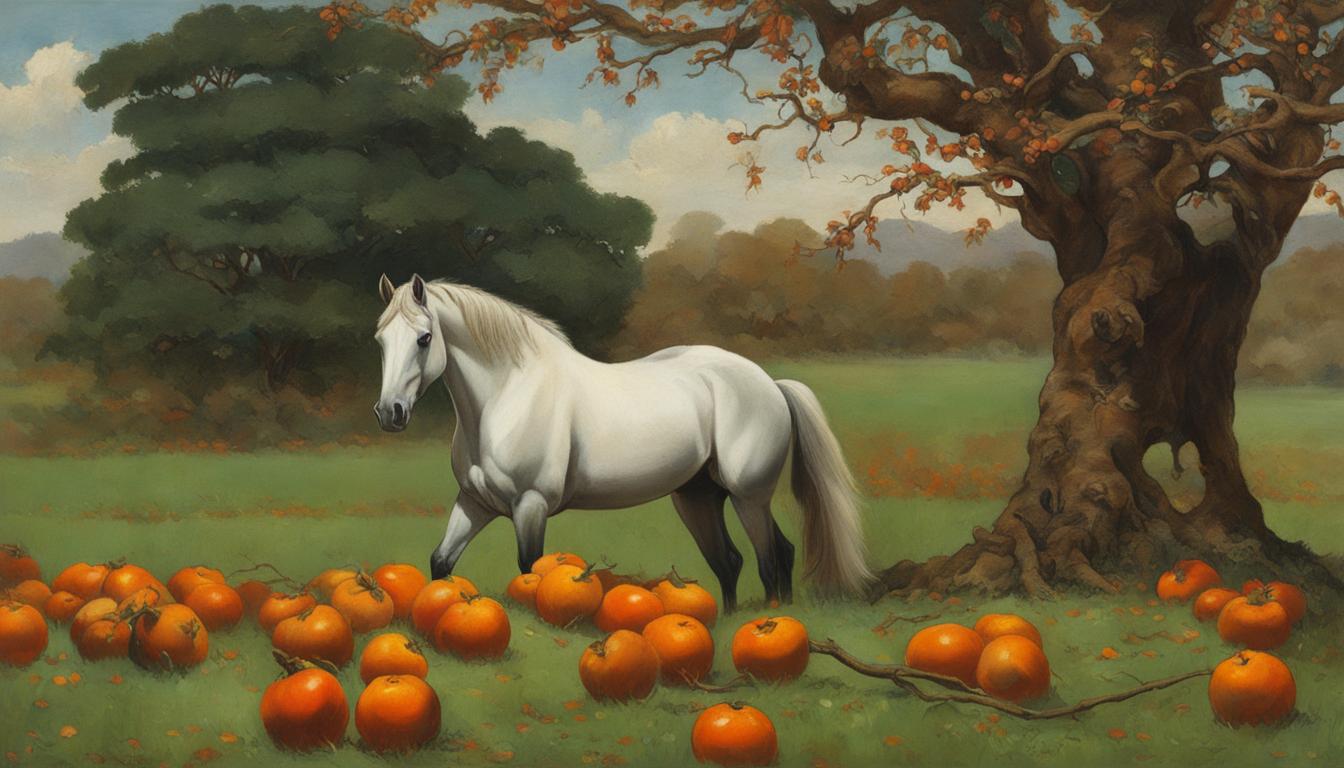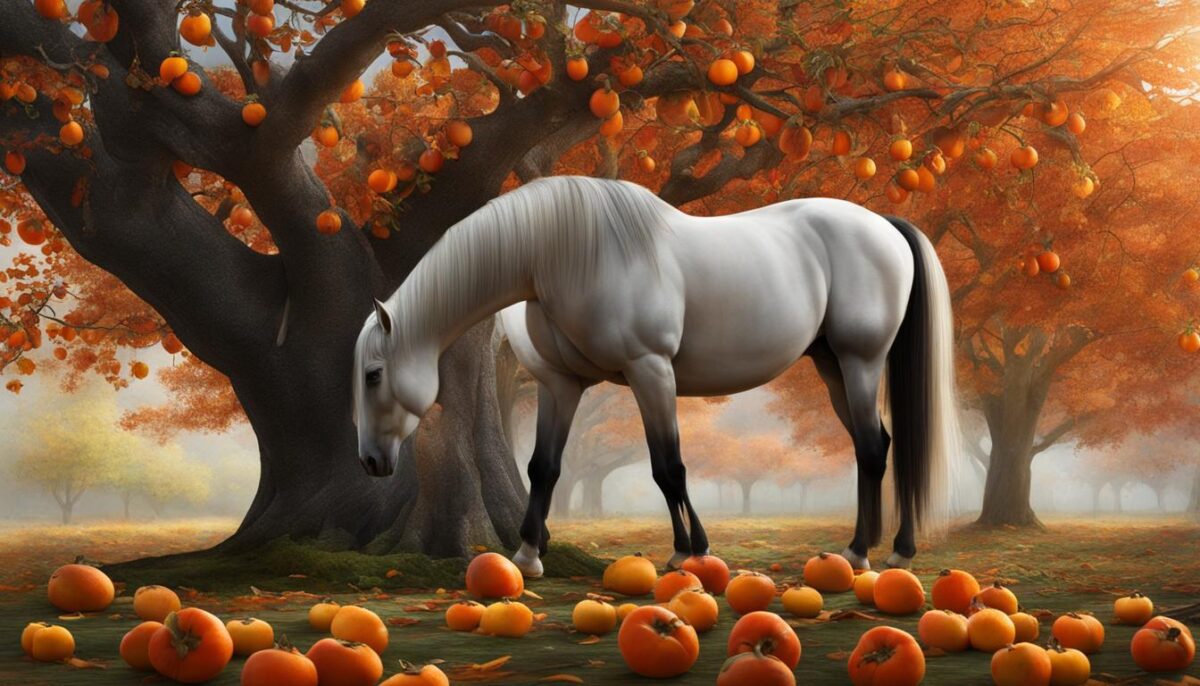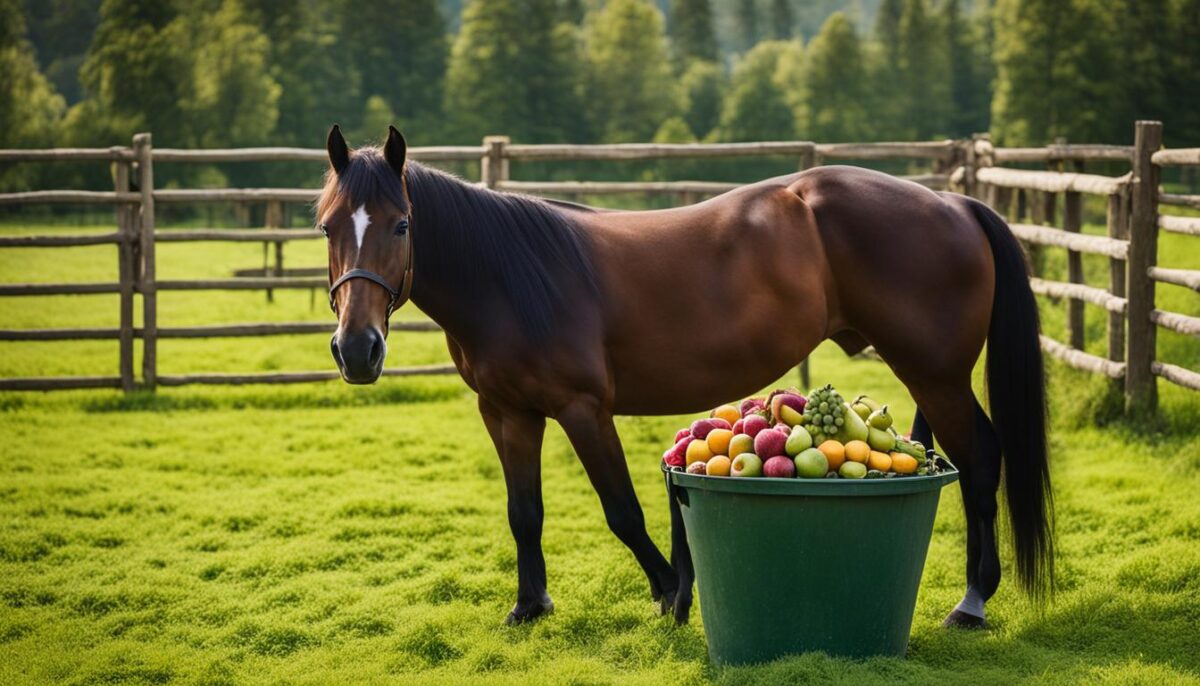When it comes to your horse’s health, what they eat is extremely important. You may be wondering if it’s safe to give your horse persimmons, a popular fruit in the southeastern United States. In this article, we will explore the risks of including persimmons in an equine diet, learn about horse health, and discuss some dietary risks for horses. Let’s dive into the world of persimmon safety and its connection to a dangerous condition called impaction colic.
Key Takeaways
- Persimmons can pose serious health risks to horses.
- Impaction colic is a painful condition that can result from ingesting the fruit.
- Understanding a horse’s digestive system and nutritional needs is crucial for optimal health.
- There are many safe and healthy treat alternatives to feed your horse.
- Avoiding toxic plants and foods can prevent illnesses and help maintain your horse’s overall well-being.
Understanding the Horse’s Digestive System
Horses rely on a delicate and specialized digestive system to maintain their health. As herbivores, their diet consists mainly of plant materials, which play a crucial role in supporting their overall wellbeing. It is important for horse owners to understand the complexities of equine nutrition and dietary management to ensure their horses avoid toxic foods and maintain optimal health.
The Importance of a Specialized Diet for Horses
A horse’s diet must be tailormade to support its unique digestive system and nutritional requirements. Grass is an essential part of their herbivorous diet, providing necessary roughage and promoting healthy teeth. When fresh grass is unavailable during colder months, hay serves as a vital substitute. Ensuring the quality and safety of the hay is essential to avoid any harmful substances or mold that could impact the digestive health of the horse.
Herbivores and Their Nutritional Needs
Herbivorous animals primarily consume plant materials, which are rich in fiber, vitamins, minerals, and other nutrients essential for their bodily functions. In addition to grass and hay, horses may require supplemental vitamins or minerals as part of their dietary management plan. This ensures that they receive a complete and balanced diet, supporting their overall health and well-being.
Risks of Inappropriate Foods for Horses
Not all foods are safe for horses, and some can lead to severe health problems or even be toxic. Horses must avoid certain foods like persimmons, bread, chocolate, and some vegetables, as these can result in negative effects on their sensitive digestive systems. By being well-informed about the potential dangers of various foods, horse owners can ensure that their horses are provided with a nutritious and safe diet.
What Horses Typically Eat
Horses usually eat pasture grass because it is natural and full of things they need. When it’s not grass-eating season, horses eat hay to keep their tummies full all day. This is because hay nutrition is important for their overall health.
Sometimes horses get fruits and veggies as yummies. But, it is important not to give too much because fruits have a lot of sugar. Horses can also eat little bits of grains like oats and barley. Some horses eat special mixes of horse feed mixes that contain grains, vitamins, and minerals to help them feel good and strong.
Here’s a list of equine dietary staples:
- Pasture grass: Horses can graze on grass all day, getting the essential nutrients they need.
- Hay: When fresh grass is unavailable, hay provides the necessary fiber and nutrition.
- Fruits and veggies: These can be given as treats but in limited amounts due to their sugar content.
- Oats and barley: These grains are often added to horse feed mixes in small portions for extra energy and essential nutrients.
- Mineral and salt blocks: Horses also need some salt to help them drink plenty of water and to maintain a balanced diet.
Keeping an eye on your horse’s diet to ensure they are getting all the essential nutrients is an important part of maintaining their health. Remember, it’s always best to consult a veterinary professional or an equine nutritionist when making changes to your horse’s feeding habits.
Can Horses Eat Persimmons?
Although persimmons might seem like a tasty treat for horses, they can pose significant equine health risks. The consumption of persimmons can lead to severe fruit hazards, including phytobezoars and colic. Therefore, it is essential to follow proper horse feeding practices and avoid offering persimmons to horses.
The Potential Dangers of Persimmons to Horses
Persimmons bear a resemblance to other fruits like peaches and apricots, which may appeal to horses. However, the seeds and skin of this fruit can cause serious issues for horses. The consumption of persimmons can result in gastrointestinal obstructions which, in some cases, require surgical intervention. Additionally, persimmons contain tannins that can upset a horse’s stomach, leading to vomiting or diarrhea.
Understanding Phytobezoars and Colic in Horses
Phytobezoars are formed when indigestible fibers, seeds, and skins accumulate in a horse’s stomach or intestines. These foreign bodies can cause partial or complete blockages, leading to impaction colic in horses. Colic is a severe form of abdominal pain that can threaten a horse’s life, and as such, colic prevention is crucial for horse caretakers.
Safe Feeding Practices for Horses
Implementing proper horse feeding practices helps minimize equine health risks and ensures the wellbeing of your horse. Some essential guidelines to follow include:
- Provide a diet primarily composed of forage, such as pasture grass and hay.
- Limit the amount of fruits and treats to maintain balanced nutrition and prevent digestive issues.
- Avoid feeding persimmons and other fruit hazards to protect your horse from colic and phytobezoars.
- Monitor your horse’s appetite, weight, and general health to identify any potential dietary concerns early on.
By adhering to these recommendations, you can keep your equine companion healthy and ultimately avoid the dangerous consequences of improper feeding practices.
Healthy Treats for Your Equine Friends
Finding the right horse treats and equine safe fruits is essential to ensure your horse enjoys nutritious snacks as part of a balanced horse diet. Horses love certain fruits and vegetables, which can serve as delicious treats that also contribute to their overall health.
One of the most loved treats by horses is carrots. They are tasty, safe, and packed with essential nutrients that benefit your horse. Turnips, parsnips, and celery are also popular horse treats due to their low sugar content and positive impact on digestion.
Some fruits that can be included in your horse’s diet are bananas and pineapples. These fruits provide valuable nutrients like potassium and vitamin C. However, it’s important to remember that fruits should be given in moderation due to their sugar content. When giving your horse treats, always chop them into small pieces to prevent choking.
Below is a list of horse-friendly fruits and vegetables that supply important nutrients and serve as tasty alternatives to potentially harmful treats like persimmons:
| Fruits | Vegetables |
|---|---|
| Apples | Carrots |
| Blueberries | Parsnips |
| Watermelon | Turnips |
| Strawberries | Beets |
| Pineapple | Celery |
| Bananas | Romaine Lettuce |
In summary, offering proper horse treats and equine safe fruits to your horse can help achieve a balanced diet while also providing delicious and nutritious options that keep them happy and in optimal health. Always remember to cut treats into small, manageable pieces to avoid choking and give fruits and vegetables in moderation to maintain a well-rounded diet for your horse.
Foods to Avoid in a Horse’s Diet
When it comes to your horse’s diet, there are certain foods that should be avoided in order to maintain their health and well-being. In this section, we will discuss the risks of feeding chocolate and caffeine, common fruits and vegetables that horses should never eat, and how to identify toxic plants and trees.
The Risks of Feeding Chocolate and Caffeine
Both chocolate and caffeine are dangerous foods for horses and can cause serious health issues. Chocolate contains theobromine, which is toxic to horses and can lead to agitation, seizures, and even death. Caffeine is also harmful, as horses are more sensitive to its effects than humans, and consumption can lead to increased heart rate, tremors, and weakness. To keep your horse safe and healthy, it’s best to avoid these substances entirely.
Common Fruits and Vegetables That Horses Should Never Eat
While some fruits and vegetables can provide beneficial nutrients to your horse’s diet, there are others that should be avoided. Horses should not consume avocados, potatoes, tomatoes, onions, or rhubarb due to their potential toxicity. Additionally, certain vegetables like cauliflower and cabbage can cause gas and discomfort in your horse’s digestive system. Keep these equine toxic substances out of your horse’s diet to ensure their health is protected.
Identifying Toxic Plants and Trees
It is crucial to be aware of the plants and trees in your horse’s environment, as some can be harmful if consumed. Carefully inspect your horse’s surroundings and grazing areas for any potentially toxic or prohibitive horse snacks, including fruit trees like cherry or apple, which have parts that can be poisonous to horses. Supervise your horse during pasture time and make sure they do not eat anything harmful to ensure their long-term health and safety.
FAQ
Can horses eat persimmons?
Although horses might be attracted to the taste of persimmons, they can be quite dangerous for them. The fibers and seeds of persimmons can get stuck in their digestive system, leading to severe gastrointestinal issues like impaction colic. It is best to avoid feeding persimmons to horses.
What should horses typically eat?
Horses need a diet rich in grass, hay, and some grains like oats and barley. They also need essential nutrients from supplements and specialized feed mixes when necessary. Occasionally, horses can enjoy safe fruits and vegetables as treats, but these should be fed in moderation.
What are some healthy treats for horses?
Horses can eat carrots, turnips, parsnips, celery, bananas, and pineapples. These treats provide essential nutrients without overloading the horse’s digestive system. Make sure to cut these treats into small pieces before feeding them to your horse to prevent choking hazards.
What foods should be avoided in a horse’s diet?
Horses should not eat chocolate, caffeine, avocados, potatoes, tomatoes, onions, rhubarb, cauliflower, cabbage, dairy products, and persimmons. These foods can be harmful to a horse’s digestive system and may cause serious health issues.
How can I identify toxic plants and trees for my horse?
Learn about toxic plants and trees specific to your region and visually inspect your horse’s pasture for their presence. Consult with a veterinarian or local equine expert to make sure your horse’s environment is free from potential risks.
What are some common symptoms of horses experiencing gastrointestinal issues from eating harmful foods like persimmons?
Symptoms may include abdominal pain, weight loss without explanation, loss of appetite, and diarrhea. If your horse exhibits any of these symptoms after consuming persimmons or any other potentially harmful food, consult a veterinarian immediately.


